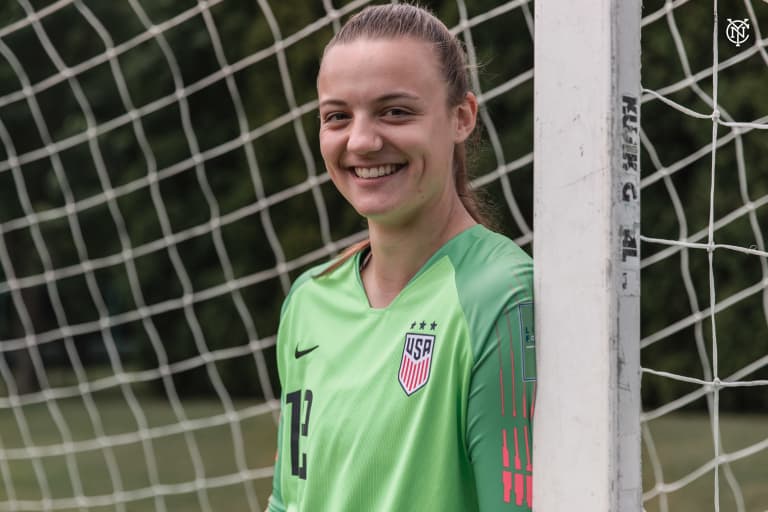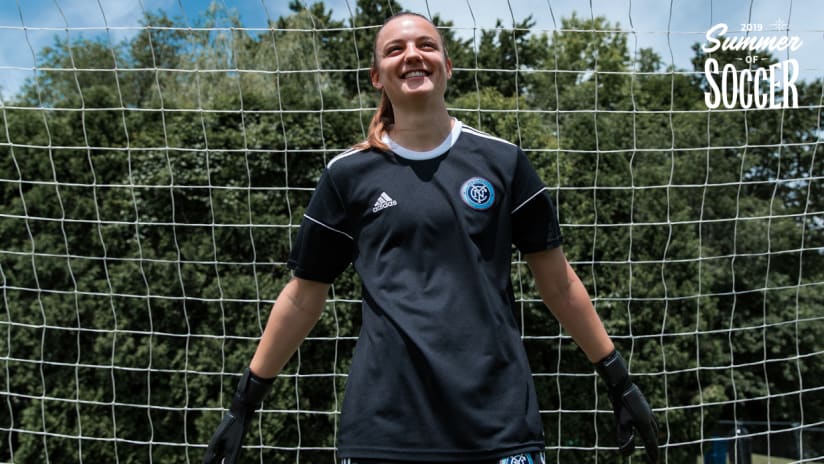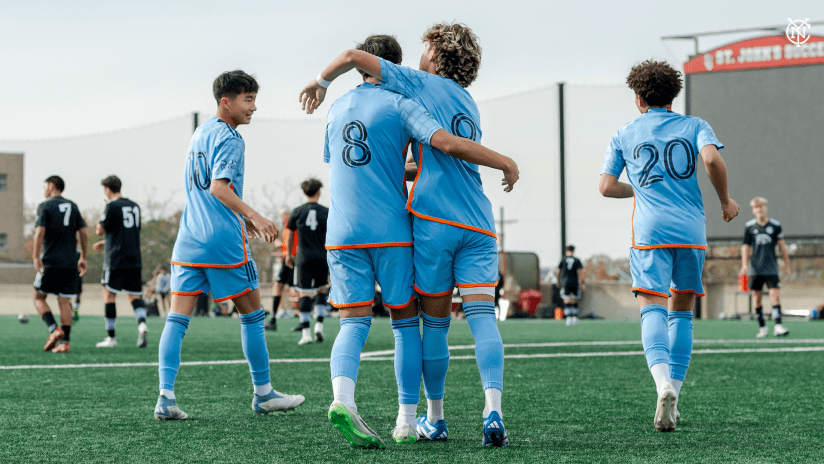Originally from Germany, Julia Dohle grew up in Scarsdale, New York and has played as a goalkeeper for New York City FC’s Girls Academy since its inception in 2017. In just a few weeks, the 18-year-old will be continuing her soccer career with at Penn State University alongside fellow NYCFC Academy alum, Angela Aguero. NYCFC.com caught up with the ‘keeper to talk about her difficult yet rewarding experience with the youth national team, the mentality for success, what it’s like training with a United States Women's National Team legend, and more.
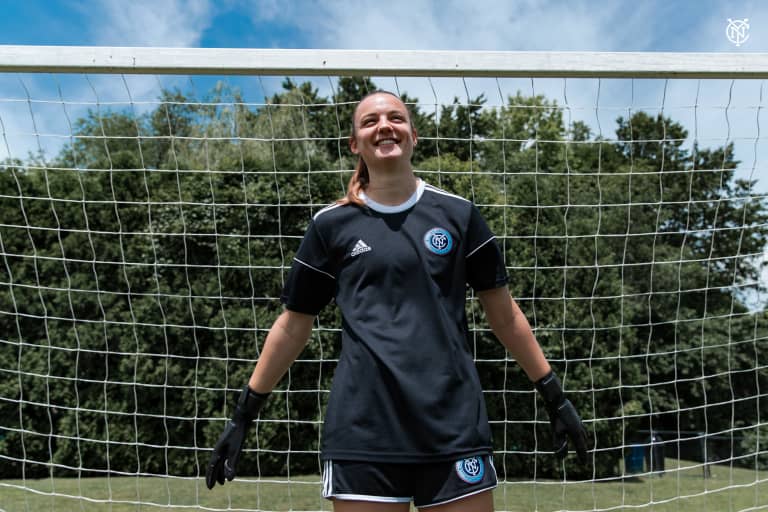
Q: Could you tell us a little bit about your journey so far and how you started playing soccer?
Julia Dohle (JD): I was born and raised in a small town in Germany. When I was 8, my dad’s work moved to New York so we came here as a family and have been living here ever since. Life was so different here than in Germany, but we adjusted well pretty quickly. Back then, I didn’t play soccer. I was actually a really good tennis player. In school I had a few friends that I would always casually play soccer with and they encouraged me to start playing on a team. It took me a while though. I didn’t speak the language so I felt uncomfortable in team environments. When I was 10, I started playing for the Scarsdale youth soccer team. I ended up being put in goal because I was tall and I was the only one who wasn’t afraid of getting hit by a ball. By the time I was 12, I was playing as a goalkeeper full-time and things just took off from there.
Q: A few years ago, you hit a bump in the road in regards to competing at the national team level. At the time, you only had your German passport so you were unable to compete for the United States in officially-sanctioned matches like Concacaf competitions and World Cup tournaments. While awaiting citizenship, how difficult that time was for you – working hard everyday, staying ready for your chance to rejoin the national team?
JD: Honestly, it really sucked. By that time, I was in with the U-15 team for about two years or so. We probably had like 9 or 10 camps, so we were spending a lot of time with each other. We were all really good friends, and soccer was something that really united all of us. When the team got transferred to U-17, I wasn’t allowed to join them until I had that piece of paper. It was tough for me because I knew it was going to take a long time for me to get my American passport and there was nothing we could do to expedite the process. I had to watch all my friends play internationally in Italy, China, Mexico and I was left behind. No matter how much I trained or how much work I put in, I was never going to be on those rosters. During my time with the national team, I was really fortunate to have met Jill Lloyden, a goalkeeper coach and former USWNT player, who I began training with a lot. Not only on the field, but she really motivated me off the field to keep working – sending texts, calling me, motivating me to keep going. It was tough because I didn’t have short term goals to work towards like making camps, so we set this 2-year goal of making the roster for the 2018 CONCACAF Women’s U-17 Championship. 2 years is a long time but she really kept me motivated, kept me training. She invited me to Sky Blue FC training sessions so when I was 15, I got to train with players like Christie Rampone, Kelley O’Hara, Sam Kerr. Jill gave me the environment that would help me stay at that level and have me prepared for U-17 World Cup Qualifying.
Q: Not many people get the opportunity to train with players of that caliber at such a young age. What was that experience like?
JD: When I trained with Sky Blue FC for the first time, I was 15 years old. You walk onto that field and you see these players putting their boots on – players like Sam Kerr, Kelley O’Hara, Christie Rampone being the legend that she is. She was my defender in one of the pickup games. Obviously as a goalkeeper, you have to communicate and yell at your defenders to move left, move right. So I was like, as a 15-year-old – how am I supposed to tell this legend that she’s in the wrong place at the wrong time? But once you step on the field, you don’t really think about who’s standing there. That was my mentality. I wouldn’t think, “Oh my god that’s Christie Rampone.” I’d think, “Okay, this is Christie. This is my defender.” Yeah, sure these players I’m on the field with have achieved such incredible things and I’m just a 15-year-old kid, but now we’re all playing this game of soccer together. It was an incredible experience. It pushed me to best the best I can be. When you’re 15 and playing with all of these great players, it really forces you to step out of your comfort zone. I didn’t get special treatment because I was young. If I was doing something wrong, they would tell me. They would support me and treat me like any other player on the field which is good. If you sugarcoat things, and you don’t treat me like everyone else then that’s not going to help me get better.
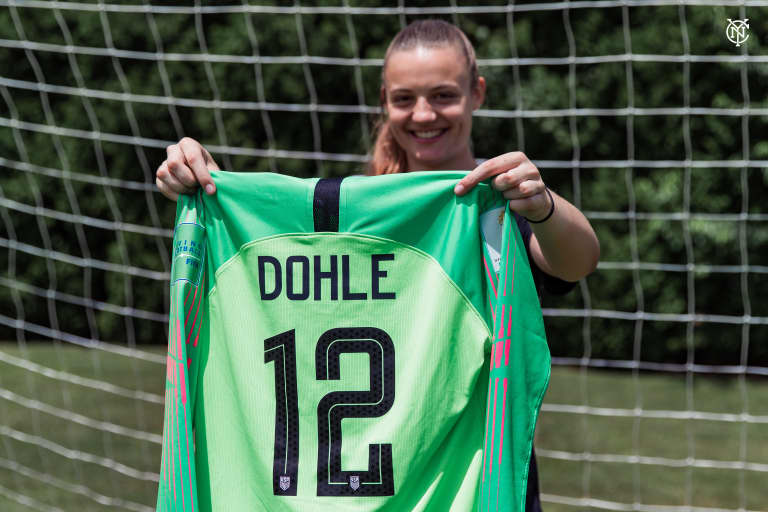
Q: During those two years, how did the way you approach the game change and prepare you for the future of your soccer career?
JD: It was a setback obviously, but I think it’s a matter of how you view those setbacks that can prepare you for something much greater in the future. This setback of not having my citizenship taught me that sometimes things happen that are out of your control. The only thing I could control was how I approached the game everyday, how much work I put in, and how motivated I stayed for that opportunity to come back. It was a major lesson I learned in terms of my mental game. Always control the controllable. Sometimes things happen that you can’t control, but if you stick to what you can control every single day then you’ll be successful in the future.
Q: You eventually received your passport and had the opportunity to rejoin the national team for the U-17 Women’s World Cup. How much more did that opportunity mean to you after all that you had gone through to get there?
JD: That was actually made even greater because of something else. I made U-17 qualifying, and we qualified for the World Cup which was great. I was back in with the team and playing really well. The World Cup was in November in Uruguay and that was obviously the main goal from the beginning. We had a camp after qualifying, and I had just moved my way up to maybe even being a starter. At the end of camp, we had a PK shootout with the boys team. I saved the PK, but I dislocated my shoulder. I was rushed to the emergency room and the doctor there told me I needed surgery and there was no way I would be back in time for the World Cup. When I got back to New York, I spoke to my doctor and he said if there wasn’t a World Cup then he would advise surgery, but there was a small chance that physical therapy could strengthen it. I asked if there would be any chance at all that I could make it back and he said it wasn’t completely impossible. So, I had the worst summer of my life. I spent 5-6 hours a day doing physical therapy trying to fix my shoulder. Meanwhile, the rest of the team is getting more games in and preparing for the World Cup. At that point, I accepted that I probably wasn’t going to make the roster but I was still going to do everything I possibly could so at the end at least I knew that I tried everything. I got cleared a week before camp and got to play against Colombia and England. After that I was in a meeting with my coach and he told me I was going to be on the World Cup roster. I don’t consider myself an emotional person, but I had to fight back the tears. it was a really fulfilling moment for me. With citizenship, injury, everything in between it was just a rollercoaster. The results didn’t go the way we wanted them to, but just being there with the team was amazing. I think if you fight as one country against other countries it really strengthens your bond as team. It was such an incredible experience and definitely worth all the hardships I had gone through to get there.
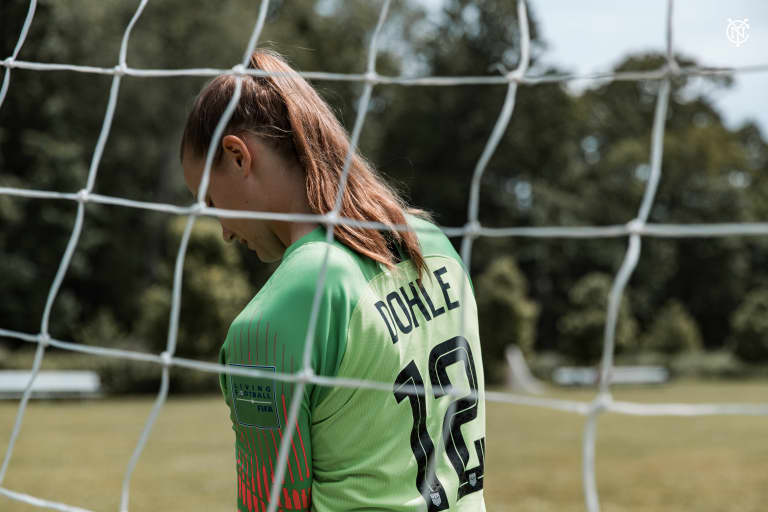

Q: Onto some fun questions... What’s your favorite World Cup memory?
Probably the 2015 Women’s World Cup Final. I was actually in Germany on vacation with my family so the game was on in the middle of the night. I just remember it being like 3-0 or 4-0 after the first 30 minutes, and it seemed surreal to me. At that point, I had been in with the U-15 team in training camps so I felt a little connected to the group. It was a really cool moment seeing them all celebrate and win that crazy final.
Q: Who are some of your favorite soccer players that you admire and why?
JD: Ali Krieger. Her story is similar to mine. She hadn't been in with the team in the past 2 years or so. She had to work when no one was watching and when people had already forgotten about her, so my story kind of identifies to hers – when I was cut off from the team and people started forgetting about me. She kept working, kept believing that she was going to be back, kept preparing knowing that she was going to get another chance. Our situations weren’t that different. Another one of my favorite players is Kailen Sheridan, she’s a goalkeeper for Canada. I look up to her a lot because I get to train with her often. She’s a role model not only in the way that she plays, but also the person that she is which is really inspiring. She’s an incredible goalkeeper and she has a really great future ahead of her. I have to give her a shoutout because I train with her all the time… But I think in general, all the women at the World Cup are role models. They have inspired so many people. Without them pushing through it and fighting against adversity everyday, the game wouldn’t be where it is today. We wouldn't have the opportunities that we do without them. Because of them, the game has been pushed to a level that was unheard of before. Every single woman that is going to this World Cup, no matter what country, has contributed to that and they have all been inspiring.
Q: What’s your ultimate goal within soccer?
JD: The big goal is to play in the World Cup. I’ve learned over the years that that is an outcome goal. Right now, I’m focused on the process of getting better everyday and working on what I can control. I can only control getting better, working on my strengths and weaknesses, and improving my game. Hopefully going to a World Cup for the United States is what’s in store for me.
Q: Do you have a message for the USWNT competing for the cup?
JD: They have put in all the work that they have to put in to get to this point. They are prepared more than anyone else could be. They should believe in what they’ve done. We are all cheering for them. We’re all wishing them the best of luck and we know that they will bring the cup back home again.
